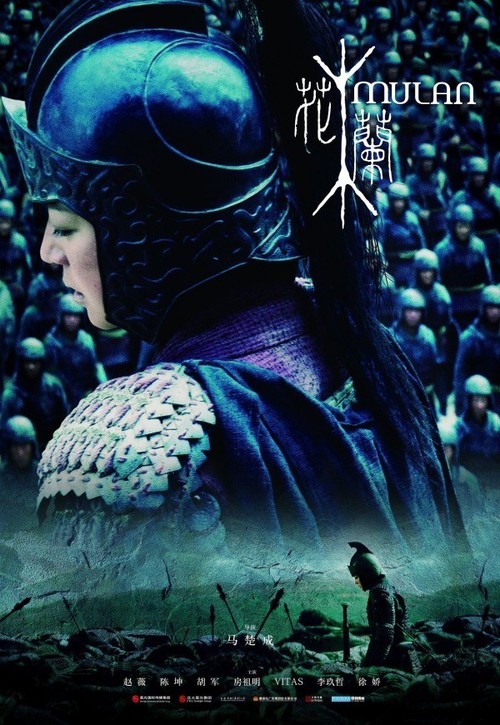The 2009 Chinese live action “Mulan: Rise of a Warrior”

Poster for the 2009 Chinese film “Mulan: Rise of a Warrior”
I want to watch this movie as I haven’t watched many films about other countries historical heroes and figures that didn’t come from Hollywood. I’d rather see Mulan as the country she came from sees her. And from what I’ve read of the plot, it is way, way better (and makes more sense) than the Disney cartoon (I’m not going to go into the whole kid’s movies vs. historical accuracy and the big shift going on with Disney’s animation studios at this time (they were closing down the one in Florida, which was the one that created “Mulan” and many of Disney’s “experimental” feature length animated films, such as “The Emperor’s New Groove”.
I watched both recently and read some reviews from the APIA on “Memoirs” and the biggest issues that came up was the way “Okasan” acted, since she was acting like an American/western “bitch” and it was to cater to western audiences. The other being that Japanese actors weren’t cast for the many of the main Japanese roles, which with “Memoirs” was a very poor choice since it is specifically about experiences unique to the Japanese in the time period that it was set.
I haven’t looked up many reviews on “The Last Samurai” or the casting, and I have mixed feelings before and after reading them. The larger issues at hand I believe are the “white savior narrative” (which I think can also be seen in James Cameron “Avatar” and as I’ve read more into it, it seems to be present in historical and science fiction genre films mainly. This is a movie trope in sociology connected to whitewashing I’ve come across recently) and the heavy romanticizing of the Meiji modernization.
For the romanticizing, I can understand the need to tell an entertaining story reasoning, but more and more, this seems to be an excuse to not try something different and the belief that audiences don’t want “reality”. In many cases, no, reality is what most are trying to take a break from by watching a movie or playing a game. But, like with PTSD, constant avoidance starts to become, ineffective, doesn’t actually solve the problem. Does that mean every show must be completely realistic and accurate. No, but I think it is time that Hollywood should start to move away from “historical fantasies” to “augmented reality” (my meaning being tailoring the story to fit reality, instead of tailoring reality to fit the story).
This is something I’ve been avoiding, well not completely as I’ve been doing research, just not posting it since it is a tough topic, but the “weeaboo”.
A weeaboo, a term that came from the dark depths of 4chan’s trolls, is someone who has taken their interest in anime/manga to actual obsessive levels, often literally wants to be Japanese and hate on anything that is not Japanese, and I mean anything (they just adopt parts of the culture or enjoy the culture, country etc. either), are often are raging white knights (meaning they can’t objectively discuss the anime they like, they fiercely defend it and there’s no point in reasoning with them) and are extremely disrespectful when it comes to Japanese culture as well, often having no interest about learning the culture that anime and manga come from, or language, or anything.
The reasons why otaku are afraid of this term is because weeaboos make it difficult to engage and learn about Japanese culture without a troll coming along and claiming “you’re not otaku, you’re a weeaboo”, it’s, anxiety ridden difficult. It is only worse when those not otaku, mainly “appropriation white knighting crusaders”, come up and claim you’re “appropriating” another culture.
To which I want to correct and say, yes I’m interacting, learning and sharing another culture while being respectful of it. However I’m NOT misappropriating this culture, and saying I can’t participate in another culture in a non-harmful manner to that group is to deny myself and anyone their “right to science and culture” and also these groups’ rights to protect them.
Article 15 of the International Covenant on Economic, Social and Cultural Rights:
“The States Parties to the present Covenant recognize the right of everyone:
(a) To take part in cultural life;
(b) To enjoy the benefits of scientific progress and its applications;
(c) To benefit from the protection of the moral and material interests resulting from any scientific, literary or artistic production of which he is the author.
The steps to be taken by the States Parties to the present Covenant to achieve the full realization of this right shall include those necessary for the conservation, the development and the diffusion of science and culture.
The States Parties to the present Covenant undertake to respect the freedom indispensable for scientific research and creative activity.
The States Parties to the present Covenant recognize the benefits to be derived from the encouragement and development of international contacts and co-operation in the scientific and cultural fields.”
Article 27 of the Universal Declaration of Human Rights:
“1. Everyone has the right freely to participate in the cultural life of the community, to enjoy the arts and to share in scientific advancement and its benefits.
2. Everyone has the right to the protection of the moral and material interests resulting from any scientific, literary or artistic production of which he is the author.“
Also the two words are used interchangeably, even through they have different meanings (I keep wanting to say there’s a reason why one word has “mis” in front of it to many articles. It is frustrating.)
Misappropriation is the correct term, as it indicates that the activity is wrongful/illegal. Appropriation is the adoption, sharing of culture that is normal.
Most of the actual misappropriation, illegal, harmful and disrespectful activity, has been with indigenous people and their culture. There are laws possibly going into place to make it illegal from the United Nations, except the laws are blanket laws and are criticized for not actually addressing the issue and instead there are concerns that they will criminalize any appropriation of any culture. So the normal sharing of culture in inadvertently being criminalized. I don’t believe it wouldn’t changed to clarify and to actually address misappropriation, but the hastiness of it at this time will cause a lot more issues that could be avoided by not being, lazy, with it.
I actually have an example of this contrast from my own journalistic experiences, with a dance that was performed at the Tribes’ farewell ceremony to former President Keegan of Peninsula College. It was explicitly stated prior to the dance that no photos, video or audio could be recorded, but all were welcomed to watch the dance that they had decided to share with us.
I immediately stopped taking pictures, turned off my camera and put it away as well (and my phone) to show my respect, sat down and watched the dance. However, the photographer the school had hired, ignored this, and had to be instructed, again, to put away his camera, stop taking photos and that being hired by the school did not exempt him from the tribe’s explicitly expressed request that the dance not be recorded in anyway. There were several tribes present at the ceremony, so I don’t recall which one had performed the dance, but I was angered at the other photographer’s extremely brazen disrespectful and entitled behavior (the other photographer was at least in his 60’s while I was in my early 20’s).
Honestly, I wish I didn’t have to look up international laws, rights, bills etc. to prove I’m not a weeaboo or committing cultural misappropriation to both otaku and society at large. So may I please watch anime and enjoy learning about another culture without being accused of doing something wrong?
One thing I want to see is the whole otaku merchandise/fan themed rooms accepted just as other themed rooms, like sports are in America. Right now anime and manga in themed rooms are mostly OK, so long as there is other geek/nerd merchandise among it all (like superheros and video games) to validate it, but alone it is not like it is in sports rooms or Western nerd/geek rooms, or even Western (the American, whitewashed cowboy westerns anyways) themed rooms.
Personally, I would love to have a room filled with mecha (giant anime robots) figurines, posters and such (along with the usual cats, dragons and Star Wars stuff) but, besides the lack of funds and space for those, I would be concerned of being judged. Actually even having just one or two mechas makes me nervous and I don’t want it to.

Nirvash Type Zero figurine from the anime “Eureka Seven”.
So these are the things I need to start looking further into, mostly the community and health issues of isolation that not just otaku culture, but most “nerd/geeky” cultures. While stereotypes aren’t true (almost always), the whole there is truth to them is sometimes true. The social awkwardness, being bullied, would rather be left alone, I wonder if the social awkwardness is a direct result of being left out since being social, outgoing, “loud” is what is acceptable in American societiy and not being quiet, reserved, daydreaming etc.
If someone who already liked nerdy things, but wasn’t pushed out of the social loop because of those things, would not be socially awkward, they might still be reserved and quiet (along with any other characteristics and traits not being pounded on, such as being disabled), but they wouldn’t have the health issues that social isolation causes.